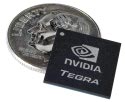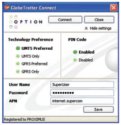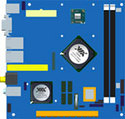Real-time Linux kernel available for ARM9 CPUs
June 6, 2008Embedded Linux developer services provider Timesys is distributing a real-time Linux kernel for ARM9-based Atmel processors. The 2.6.24.4-rt4 kernel includes Ingo Molnar and Thomas Gleixner's RT_PREEMPT patch, along with patches for high-resolution timers and other board-specific features for Atmel reference platforms. (more…)
 Pika Technologies is shipping an IP-PBX appliance with a cross-compiling SDK (software development kit) based on Denx Linux and the open source Asterisk PBX software stack. “Pika Warp, the Appliance for Linux” supports 32 simultaneous calls, and provides music-on-hold and power failure transfer, the…
Pika Technologies is shipping an IP-PBX appliance with a cross-compiling SDK (software development kit) based on Denx Linux and the open source Asterisk PBX software stack. “Pika Warp, the Appliance for Linux” supports 32 simultaneous calls, and provides music-on-hold and power failure transfer, the…  A software tool aimed at helping users administer macro benchmarks like kernel compile time tests has achieved its first stable release. Version 1.0 of the Phoronix test suite can download and compile various well-known open source packages, or users' own software, generating detailed XML/HTML reports.
A software tool aimed at helping users administer macro benchmarks like kernel compile time tests has achieved its first stable release. Version 1.0 of the Phoronix test suite can download and compile various well-known open source packages, or users' own software, generating detailed XML/HTML reports.  Nvidia has added to its family of ARM11-based SoCs for mobile Internet devices (MIDs). For now limited to Microsoft Windows Mobile, the Tegra 600 and 650 boast IDE interfaces, HD encoding/decoding, and 10 times better power efficiency than x86-based alternatives, Nvidia suggests.
Nvidia has added to its family of ARM11-based SoCs for mobile Internet devices (MIDs). For now limited to Microsoft Windows Mobile, the Tegra 600 and 650 boast IDE interfaces, HD encoding/decoding, and 10 times better power efficiency than x86-based alternatives, Nvidia suggests.  Belgian wireless firm Option has ported its network connection management utility to Linux, with the aim of targeting mobile Internet devices (MIDs). GlobeTrotter Connect for Linux aims to help users of Atom-based MIDs running Moblin Linux manage their 3G, Bluetooth, WiFi, and eventually, WiMAX…
Belgian wireless firm Option has ported its network connection management utility to Linux, with the aim of targeting mobile Internet devices (MIDs). GlobeTrotter Connect for Linux aims to help users of Atom-based MIDs running Moblin Linux manage their 3G, Bluetooth, WiFi, and eventually, WiMAX…  Logic has announced a system-on-module (SOM) and development baseboard aimed at bringing ARM's newest Cortex-A8 architecture to medical devices. Logic's 3 x 1.3 inch “OMAP35x SOM-LV” baseboard and “Zoom OMAP35x” dev kit offer a choice of four Cortex-A8 processors, and comes with a Linux 2.6.22 BSP (board support package).
Logic has announced a system-on-module (SOM) and development baseboard aimed at bringing ARM's newest Cortex-A8 architecture to medical devices. Logic's 3 x 1.3 inch “OMAP35x SOM-LV” baseboard and “Zoom OMAP35x” dev kit offer a choice of four Cortex-A8 processors, and comes with a Linux 2.6.22 BSP (board support package).  Intel has released a Mini-ITX motherboard incorporating its new Atom 230 CPU and selling for around $80. Bound for a variety of “nettops” and other devices, the D945GCLF (“Little Falls”) has serial, parallel, and IDE interfaces, six USB ports, 10/100 Ethernet, and HD audio.
Intel has released a Mini-ITX motherboard incorporating its new Atom 230 CPU and selling for around $80. Bound for a variety of “nettops” and other devices, the D945GCLF (“Little Falls”) has serial, parallel, and IDE interfaces, six USB ports, 10/100 Ethernet, and HD audio.  Wind River is readying a vertical-market Linux distribution specifically for MIDs (mobile Internet devices). Wind River Linux Platform for Mobile Internet Devices is the company's second “Platform” product to target Intel's Atom processor, and its second developed in collaboration with Intel, it says.
Wind River is readying a vertical-market Linux distribution specifically for MIDs (mobile Internet devices). Wind River Linux Platform for Mobile Internet Devices is the company's second “Platform” product to target Intel's Atom processor, and its second developed in collaboration with Intel, it says.  Via has updated its seven-year-old Mini-ITX specification, to better enable modern PC technologies like PCIe graphics cards, Blu-Ray disks, and SATA-II storage. The “Mini-ITX 2.0” standard adds a x16 (“by 16”) PCI Express lane and other requirements, some aimed at showcasing Via's newest chip-level products.
Via has updated its seven-year-old Mini-ITX specification, to better enable modern PC technologies like PCIe graphics cards, Blu-Ray disks, and SATA-II storage. The “Mini-ITX 2.0” standard adds a x16 (“by 16”) PCI Express lane and other requirements, some aimed at showcasing Via's newest chip-level products.  Flash memory pioneer SanDisk launched a line of SSDs (solid state disks) aimed at ultra low-cost PCs (ULCPCs) and “netbooks.” Due in August, the pSSD line includes 4GB, 8GB, and 16GB models boasting claimed read speeds of 39MB/s and streaming write performance of 17MB/s.
Flash memory pioneer SanDisk launched a line of SSDs (solid state disks) aimed at ultra low-cost PCs (ULCPCs) and “netbooks.” Due in August, the pSSD line includes 4GB, 8GB, and 16GB models boasting claimed read speeds of 39MB/s and streaming write performance of 17MB/s.  Asus announced two new versions of its Eee PC, both based on Intel Atom processors. The Eee PC 901 and 1000 models provide 8.9-inch and 10-inch displays, respectively, and add Bluetooth, longer battery life, improved shock resistance, faster WiFi, more storage, and WiMAX options, says Asus.
Asus announced two new versions of its Eee PC, both based on Intel Atom processors. The Eee PC 901 and 1000 models provide 8.9-inch and 10-inch displays, respectively, and add Bluetooth, longer battery life, improved shock resistance, faster WiFi, more storage, and WiMAX options, says Asus.  MSI has announced a low-cost “netbook” based on Intel's N270 Atom processor. The “Wind NB U100” includes a 10-inch display, 80GB hard drive, 1GB of RAM, webcam, five-hour battery life, 802.11b/g, and Bluetooth wireless, and can be overclocked to 1.9GHz, according to the company.
MSI has announced a low-cost “netbook” based on Intel's N270 Atom processor. The “Wind NB U100” includes a 10-inch display, 80GB hard drive, 1GB of RAM, webcam, five-hour battery life, 802.11b/g, and Bluetooth wireless, and can be overclocked to 1.9GHz, according to the company.  Two vendors of Linux mobile phone software announced support for Texas Instruments's newest applications processor for mobile phones. At Computex Taipei, Movial Creative Technologies is showing its IXS (Internet eXperience Stack) mobile toolkit, and Azingo is demonstrating its…
Two vendors of Linux mobile phone software announced support for Texas Instruments's newest applications processor for mobile phones. At Computex Taipei, Movial Creative Technologies is showing its IXS (Internet eXperience Stack) mobile toolkit, and Azingo is demonstrating its…